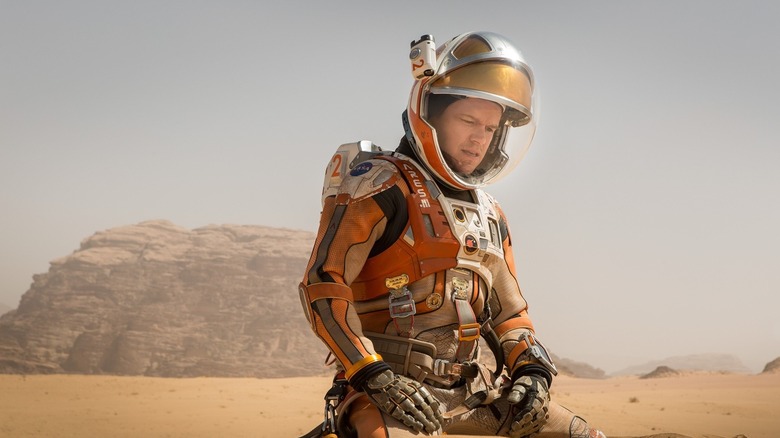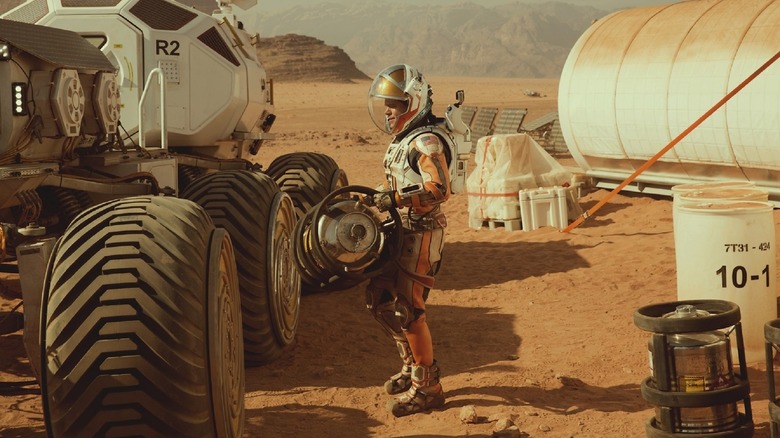The Underlying Question That Guided Matt Damon And Ridley Scott Through The Martian
Ridley Scott's 2015 film "The Martian," based on the novel by Andy Weir, was one of the year's best films. Set in the near future, "The Martian" tells the story of a botanist named Dr. Mark Watney (Matt Damon) who went on a mission to Mars with a team of other astronaut researchers. When a storm hit the Martian surface, the astronauts fled, forced to leave Watney behind. Watney, having limited air and resources, assesses his situation and begins constructing a long-term shelter. Using his botanical know-how, and possessed of gumption and optimism, Watney proceeds "to science the s*** out of" the situation, teaching himself how to grow food in the Martian soil and keep his air supply viable. He also scours nearby Martian landing sites, looking for communication equipment that would allow him to contact Earth.
"The Martian" values scientific knowledge, arguing that being well-educated and highly trained are practical and exhilarating virtues. Even more so, "The Martian" values good humor and lighthearted tenacity. Watney is unbearably effed, and yet he faces his situation with jokes and a sparkle in his eye. A sense of humor, "The Martian" argues, might be humanity's most vital survival trait.
Indeed, the lighthearted, almost jokey tone of "The Martian" might be seen to undercut the direness of Watney's predicament. The humor was a vital theme of the movie, but it was concerning to Damon who felt that audiences might detach from the danger. In a 2015 interview with Smithsonian Magazine, Damon said he talked to his director about balancing tones. Scott, luckily, offered a practical answer.
Long shots were the answer
Damon recalled the first conversation he had with Ridley Scott. His primary concern was selling "The Martian" as a survival thriller. Damon, an affable and funny performer, could easily provide the humor, but it would be up to Scott to wring tension from the script. Damon said:
"[I asked Ridley Scott] How do we infuse it with some sense of dread and terror and have the stakes as high as they can be, which you really need for the movie to work, and to create a realistic look at the situation the guy is in ... while retaining the humor and the fun? Because it's a really entertaining story. It's funny in a lot of places. That was always the line tonally we had to walk. [...] How do we, without changing the DNA of the movie, get little moments in there that will keep that tension?"
Scott's solution was simple and elegant. Dr. Watney is supposed to be all alone on Mars, and Scott merely needed to shoot his little lonely Martian from a great distance to stress his isolation. Watney may have been driving in a Mars rover listening to disco hits and joking about everything he sees, but a long, silent shot would communicate that, yes, he is indeed still screwed. Damon continued:
"We ended up shooting in the desert, in Wadi Rum, Jordan. And Ridley said, 'Look, it could be just as simple as looking at your small figure on this vast expanse of desert. Or you in the rover puttering along, this tiny vehicle on this giant, inhospitable planet.' Shots like that serve as a reminder of the fix this guy is in, and ramp up that sense of dread."
Incidentally, Denis Villeneuve shot his recent "Dune" movies in a nearby Jordanian desert.

